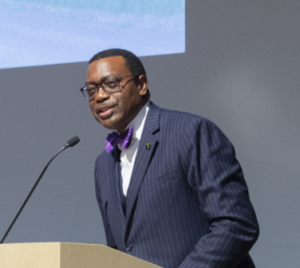…As 49% Of Population Lives In Slums
The President of African Development Bank (AfDB), Dr. Akinwumi Adesina, has charged the Nigerian government to urgently introduce welfarist policies needed to ensure all Nigerians have access to basic and affordable housing.
Adesina, who gave the charge in his lecture at the occasion where he was honoured with the Obafemi Awolowo Leadership Prize for his visionary, inspiring, and transformative leadership at the weekend in Lagos, noted that data produced by the UN Habitat, reflected that 49% of Nigeria’s population, which is equivalent to 102 million people, live in slums.
According to him, what people need is decent housing and not upgrading of slums as “there is nothing like a 5-star slum. A slum is a slum.”
During the lecture, Adesina identified five critical areas that Nigerian and African leaders needed to focus on to transform their economies and people’s lives as including, the transformation of the rural economy and food security, health security for all, education for all, affordable housing for all and government accountability and fiscal decentralisation for a true federalism.
On the increasing worrisome food insecurity in the continent, Adesina said a better Africa must start with transforming rural economies, “that is because some 70% of the population lives there. Rural poverty is extremely high. At the heart of transforming rural economies is agriculture, the main source of livelihoods.
“When rural economies falter, nations falter. This leads to the spread of anarchy and terrorists who take advantage of the economic misery to entrench themselves”, the development finance banker added.
He highlighted how the AfDB had been supporting a farm revolution at scale across the continent with the investment of “over $8.5 billion in agriculture in the past seven years which has impacted 250 million people.
“The African Development Bank and development partners are providing $1.4 billion for the development of 25 Special Agro-Industrial Processing Zones in eleven countries”, Adesina stressed.
In Nigeria alone, he disclosed that the bank was developing these zones in eight of the country’s 36 states with $518 million while another $1 billion will go into the second phase of the programme, which will cover 23 more states.
Expatiating further on Healthcare, the AfDB chief maintained that “Nigeria needs health care for all as smart governments provide universal basic health coverage for their citizens.”
While shedding light on how sicknesses and diseases cost Africa $2.6 trillion in lost productivity, he
recounted how the Covid-19 pandemic caught Africa unprepared, unprotected and left at the bottom of the ladder when it came to the distribution of vaccines.
He explained the various initiatives the Bank Group introduced to address Africa’s health needs including a $10 billion facility to support countries to cope with the pandemic; a $3 billion program to revamp Africa’s pharmaceutical industries and the recent launch of the African Pharmaceutical Technology Foundation to support access to proprietary technologies from global pharmaceutical companies.
On the imperative of securing the health of all Nigerians by the Federal Government, Adesina said: “This will require ensuring that no citizen travels more than a few kilometers to find a health care center. The widespread use of mobile health centers, e-health facilities, the digitalization of health systems, especially in all primary health care centers, health insurance policies for all, including innovative micro-health insurance pay-as-you-go systems, will capture the bulk of the population that is in the informal sector.”
This is even he stressed the need for the Nigeria government to provide education for all, noting that the United Nations Children’s Education Fund (UNICEF) reported that Nigeria accounted for 15% of the total population of out-of-school children, which includes over 10.2 million at the primary school level and 8.1 million at the Junior Secondary School.
He explained: “This is not a gold medal Nigeria should be proud of wearing. The poor funding of universities, lack of basic infrastructure, poor incentives for lecturers and incessant strikes due to wage disputes, have almost crippled the university system.”
Adesina cited the example of the Bank Group’s investment of $614 million in Nigeria’s IDICE programme to support the development of digital and creative enterprises, adding that the programme is expected to create 6.3 million jobs and add an estimated $6.4 billion to the nation’s economy.




